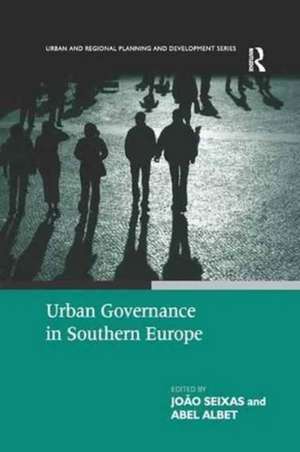Urban Governance in Southern Europe
Autor Abel Albet Editat de João Seixasen Limba Engleză Paperback – 15 noi 2016
| Toate formatele și edițiile | Preț | Express |
|---|---|---|
| Paperback (1) | 323.23 lei 6-8 săpt. | |
| Taylor & Francis – 15 noi 2016 | 323.23 lei 6-8 săpt. | |
| Hardback (1) | 705.81 lei 6-8 săpt. | |
| Taylor & Francis – 28 dec 2012 | 705.81 lei 6-8 săpt. |
Preț: 323.23 lei
Nou
Puncte Express: 485
Preț estimativ în valută:
61.86€ • 64.21$ • 51.58£
61.86€ • 64.21$ • 51.58£
Carte tipărită la comandă
Livrare economică 24 martie-07 aprilie
Preluare comenzi: 021 569.72.76
Specificații
ISBN-13: 9781138266940
ISBN-10: 1138266949
Pagini: 256
Dimensiuni: 156 x 234 mm
Greutate: 0.45 kg
Ediția:1
Editura: Taylor & Francis
Colecția Routledge
Locul publicării:Oxford, United Kingdom
ISBN-10: 1138266949
Pagini: 256
Dimensiuni: 156 x 234 mm
Greutate: 0.45 kg
Ediția:1
Editura: Taylor & Francis
Colecția Routledge
Locul publicării:Oxford, United Kingdom
Cuprins
Contents: Introduction, João Seixas and Abel Albet; The improbable metropolis: decentralisation and local democracy against metropolitan areas in the Western world, Christian Lefèvre; The institutional dimension to urban governance and territorial management in the Lisbon metropolitan area, José LuÃs Crespo and João Cabral; Competitiveness and cohesion: urban government and governance’s strains of Italian cities, Francesca Governa; Urban governance and the ’profiles’ of Southern Italy cities, Carla Tedesco; The challenges of urban renewal: 10 lessons from the Catalan experience, Oriol Nel-lo; Cities and urban and metropolitan regions in Spain: a new agenda in a global context, Joan Romero-González and Joaquin Farinós-Dasi; The governance of French towns: from the centre-periphery scheme to urban regimes, Gilles Pinson; Integrated urban interventions in Greece: local relational realities unsettled, Ioannis Chorianopoulos; A city hall for the competitive city: urban management and urban governance in Slovenia, Irena Baclija; Urban governance in Istanbul, Nil Uzun; Urban governance in the South of Europe: cultural identities and global dilemmas, João Seixas and Abel Albet; Index.
Descriere
This volume examines the issues of urban governance in the Southern European context. Illustrated by case studies of several main cities and metropoles on the North Mediterranean coast, it introduces and critically analyses the latest theories and approaches to urban governance. It questions how the 'real' or socio-cultural notion of city seems to have been separated from that of the 'political' city and explores how more integrated socio-political forms might be developed. It looks at current structures, dynamics and cultures of governance in urban development and questions whether they are well adapted to new realities and challenges.

















